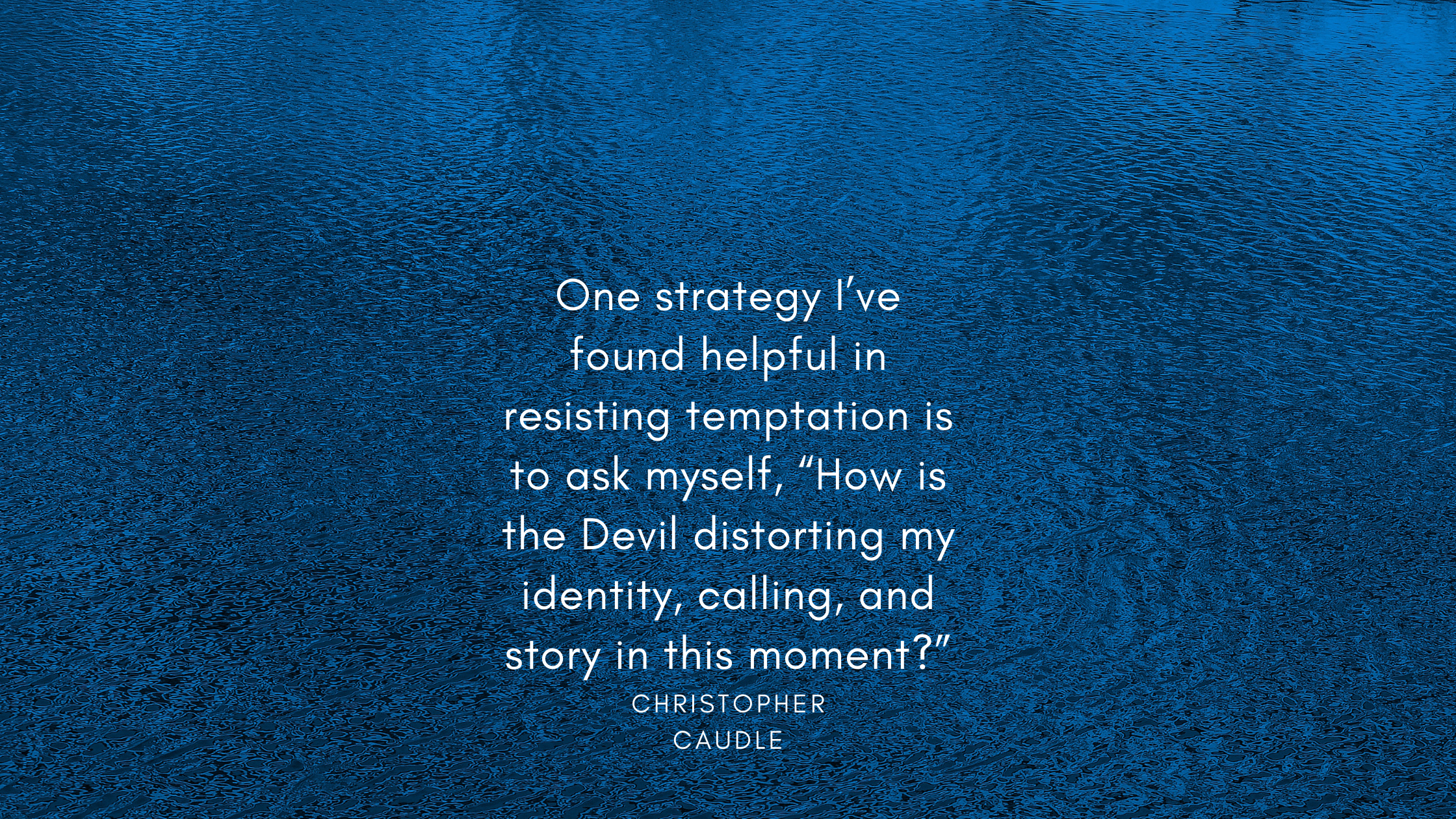Lent, Temptation, and Fruity Pebbles
A Bowl of Fruity Pebbles.

Saturday Morning cartoons sometimes had accessorizing cereals, and one of the most deliciously disgusting is Fruity Pebbles. These colorful rice smushings have been sugared and marketed with great success for over a generation.
You can read more about them here, watch how they are made here, and find out where to buy them here (as if you don't know).
I thought about Fruity Pebbles yesterday after Mark’s gospel account of Jesus’ temptation. Temptation is by definition tempting, and it presents itself to us in a variety of colorful, sweet, immediate ways.
And, unlike Jesus’ successful refusal to turn stones into bread, temptation’s victory over us can leave us feeling as though we’ve just eaten a bowl full of rocks.

The Devil's One Offer
Listen to Christopher's sermon on "The Devil's One Offer."
The Devil’s One Offer in every temptation is that you can go faster, get further, be more satisfied and experience better if you will just take this next step without God.

That next step is almost always specially tailored to you or to me. The next decision, the next text message, the next problem, the next relationship, the next meeting, the next corner of your life, the next distraction, the next pain, the next five minutes.

Temptation never demands everything up front. How could a bowl of cereal coerce anyone?
Temptation just wants you to imagine making the next move without God.

Paul and Puffed Rice
Paul the apostle wrote to followers of Jesus in the city of Corinth because they were facing temptations of nearly every flavor.
He begins chapter 10 by describing the offer the Devil makes as he tempted Israel to choose their next steps apart from God and the terrible consequences of their choices.
And, despite the external novelty and thrill of the Devil’s One Offer to the Corinthians, underneath the temptations of their day are the same as those that tripped up the Israelites a thousand years earlier.
Puffed rice in a bowl. Confetti-ed, crackling smush.

As Paul writes in 1 Corinthians 10.13
No temptation has overtaken you except what is common to mankind. And God is faithful; he will not let you be tempted beyond what you can bear. But when you are tempted, he will also provide a way out so that you can endure it.
He goes on in the rest of the 10th chapter to encourage the Corinthians to flee from idolatry in their worship and in their lives because turning away from God either in seemingly important things (apostasy) or apparently small things (dinner plans) can each further the enemy’s plan to separate you from God.
%20or%20apparently%20small%20things%20(dinner%20plans)%20can%20each%20further%20the%20enemy%E2%80%99s%20plan%20to%20s.png?width=2240&name=Turning%20away%20from%20God%20either%20in%20seemingly%20important%20things%20(apostasy)%20or%20apparently%20small%20things%20(dinner%20plans)%20can%20each%20further%20the%20enemy%E2%80%99s%20plan%20to%20s.png)
Idolatry and Addition
Idolatry as an approach always tempted the people of God by presenting a strategy of addition.
“You can,” the false prophets offered, “add other deities to the God you prefer, so you never had to fully reject the true God. You just take a respite from him from time to time. Make the next choice without him.”
This helps explains how the Devil tried to appeal to Jesus not simply with allurements to base or evil things, but attempted his appeal even on the basis of scripture, God’s promises, God’s goals, even God’s direct words to Jesus.

But Jesus knew that the Devil was making his one offer, and he rejected it victoriously.
Whether specific pointed questions or a season of trials, Jesus knew that drawing near to the Father was the effective response to the Devil’s One Offer.
Deadly Effectiveness
The Devil’s One Offer makes up for its lack of originality in its deadly effectiveness.
It has stumbled many of the world’s most gifted and admired people.

It worked with Eve and with Adam.

It worked with Israel in the wilderness and later with their kings and people.

It so often (too often) still works on us.

“Not forever”, we say. “But just for the next two weeks, the next decision cascade, or lunch appointment.” “ I think I can get better results or enjoy life more if I just do this without God."
This lie did not work on Jesus.
Movie Poster Distortion
While Jesus did use scripture to defeat the pointed barbs of the Devil’s One Offer, we will miss part of His glory if we imagine him standing as a single figure alone under testing.
Jesus faced the enemy as a person with an identity, calling, strength, and story rooted in his relationship with God.
The image of the solitary autonomous man resisting the slings and arrows of satanic lies is imaginary. That movie poster stance is often itself a temptation.

Imagining Jesus alone in a Stoic mode will distort our appreciation of the relationship with the Father he drew upon as a resource to withstand deprivation, deception, and the wilderness’ harsh environment.
Imagining ourselves alone, as a plan or as a goal, as we face the Devil’s One Offer will doom us to failure altogether.
Recognize the Fun House Mirror
One strategy I’ve found helpful in resisting temptation is to ask myself, “How is the Devil distorting my identity, calling, and story in this moment?”

There is a funhouse mirror quality to every temptation, and the Devil purposefully distorts our perception of 1) who we are, 2) what we are called to be, and 3) what story we are in.
As an example, temptation may collapse your story by encouraging you to not think about your life or relationships and just think about the next moment.
People will often confess that they never imagined how their anger or envy would affect their family or their job. “I was just responding to the frustrating client” or “I was only trying to match the car that my coworker is driving.”

Temptation may stretch your story by encouraging you to use past experiences as an explanation for why some temptations do not apply to you. “I proved long ago that I was trustworthy” or “No-one in my family can handle these kinds of problems well.”

In contrast to these distortions our story, Jesus steps into the story God is telling in the world for the sake of drawing near to us.
Let Jesus Embrace Your Story
The story of Israel before Jesus included true blessing, true sorrow, true brokenness and true mercy, but only Jesus could fully embrace the entirety of Israel’s story and move it forward.
In his perfect obedience, he embraced the entirety of Israel’s story and fulfilled it.
He offers that same embrace to our stories as well, drawing near to us in all our pasts and moments, our patterns and uniqueness.

He does not deny or minimize any of it. He also does not allow his redeeming work to stay isolated from all of our life, past present and future.
An Invitation to Draw Near
The Devil’s One Offer depends on us accepting a distortion of our true identity, calling, and story.
And whether we are still considering temptation, in the middle of temptation, or picking ourselves up in the aftermath of temptation, the only good news is that Jesus has come and invites us to draw near to him.
Fundamentally, we draw near to him and He draws near to us.
Unwind the Devil’s One Offer and turn back to God.
Before it’s too late.
But especially if the Devil says it is too late.

What Jesus Can Do
Jesus Christ can grant us a new identity, commission, and he can straighten out our stories. Together.
Jesus’ victory over temptation wins our confidence. Hs sympathy with those being tempted wins our hearts. (Hebrews 2:18, 4:15)
He invites us to draw near, turn away from our sins and experience life everlasting.
What Should You Do?
So humble yourselves before God. Resist the devil, and he will flee from you. Come close to God, and God will come close to you. Wash your hands, you sinners; purify your hearts, for your loyalty is divided between God and the world. Let there be tears for what you have done. Let there be sorrow and deep grief. Let there be sadness instead of laughter, and gloom instead of joy. Humble yourselves before the Lord, and he will lift you up in honor. (Hebrews 4.1-10 NLT)
Compared to that, the Devil’s One Offer is just an empty bowl of Fruity Pebbles.
Today’s a good day to stop chewing on rocks.

One Last Thing
Lent is a time that we encourage one another to examine our hearts, either for the first time or again after a long time, and turn away from the sins that separate us from God and one another.
Only Jesus’ victory over sin and death at Easter make this kind of careful self-examination possible and profitable.
If you recognize that you have accepted the Devil’s One Offer and wonder how to draw near to God through the good news of Jesus, we would love to talk and pray with you. Sin’s consequences are painful and destructive, but the mercies of God are new and healing.
To listen to Christopher's sermon related to this topic, click here.
Tell us what you think about this topic! Put your comments and questions below.
